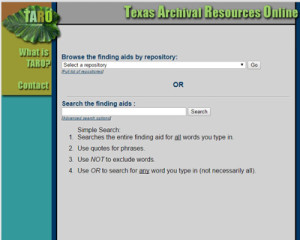Recently, I wrote about a terrific conference sponsored by the Dallas Genealogical Society that I attended earlier this month. One of the most useful topics discussed was Finding Aids.
Finding Aids can be found in many libraries, archives, special collections, and museums. Many are online either at the collection site or at TARO, Texas Archival Resources Online. These aids or guides help a researcher find what materials can be found in that particular location.
Finding Aids begin with an overview or what to expect to find in the collection. Then a brief history of the person, family or state agency is next. Dates and types of records are included in the section titled Scope and Content. Any restrictions for use are shown. It should be noted that most documents created by state or local government are not copyrighted. Related books and articles about the subject are listed. An example of the preferred citation is given. The meat of the Finding Aid is found in Detailed Descriptions with the box or folder number. That is the information you will need when you visit the repository.
I typed in “Hunt County” at TARO and found eighty-seven hits, many which really intrigued me. Because the Hunt County Courthouse was the prototype for the Travis County Courthouse in 1929, records, blueprints, and media presentations can be found in two collections at the Alexander Architectural Archive at the University of Texas, and one collection at the Austin History Center.
Another interesting collection is the Bertram C. Hill Architectural Collection at the DeGolyer Library on the SMU campus. In it are drawings for a home in the Floyd-Merritt (sic) area. I know that is one that I definitely want to see.
There are a lot of county records at the Texas State Archives in Austin. Among the interesting collections are State Surveyors records from 1853 -1983, especially concerning the county boundaries when Rains, Delta, and Rockwall Counties were created. District and County Court records from 1852-1857 are there. Yet records from the County and District Court Clerks pertaining to county headrights returns are found at the Texas General Land Office.
Two sets of personal papers of interest are the Minnie Fisher Cunningham Texas Equal Suffrage Association correspondence and reports from Hunt County 1918-1919 found at the Houston Public Library and the Clyde McQueen papers at Cushing Memorial Library on the Texas A&M University campus in College Station. McQueen is the author of Black Churches in Texas that included St. Paul’s Church in Neylandville. The book can be found at the W. Walworth Harrison Public Library in Greenville.
Different sorts of personal papers, those that tell personal stories of an individual or family are frequently given to repositories. David Anders wrote a short memoir about his life in Arkansas before migrating to Hunt County. A typeset version is available at the Dolph Briscoe Center for American History in Austin. The Grayson Family papers at the Daughters of the Republic of Texas Library on the Alamo grounds in San Antonio tell about life in early Hunt County.
Knowing what to ask for when you arrive at one of these repositories is quite important. Using TARO and other websites that offer excellent finding aids will make your research trip worthwhile.

